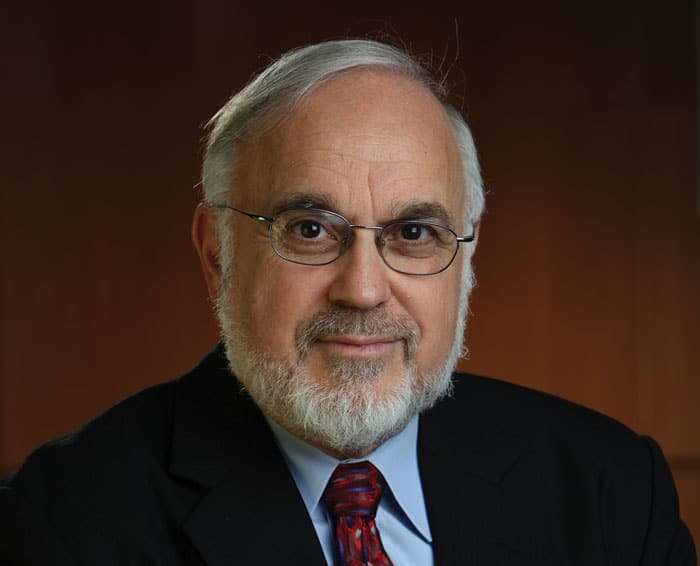 Rabbi Abraham Cooper
Rabbi Abraham Cooper Rabbi Abraham Cooper didn’t get on a plane until he was 18 and he went to study in Israel. But since he started working for the Simon Wiesenthal Center over four decades ago, he hasn’t stopped traveling around the world.
“My mom is 96 years old, and she’s lived in the same apartment in Flatbush for the past 65 years,” Cooper said. “We’re not exactly the wandering type. But I’ve now got more than 6 million miles on American Airlines. Who knew?”
Cooper is associate dean and director of Global Social Action for the Simon Wiesenthal Center, the Jewish human rights organization. Through his position, he’s met with Pope Francis, attended the Abraham Accords ceremony at the White House and ran a multifaith memorial program in Indonesia after a terrorist attack. Essentially, his job is to be a professional activist for the Jewish people.
“I’ve been blessed by the good Lord with being able to develop relationships with people, since most of what I do is negative and dark and bad and figuring out a way to respond,” he said.
Cooper grew up in Flatbush in a Modern Orthodox family in Brooklyn. His father, of blessed memory, was a Judaic studies and Talmud teacher, and his mom was a stay-at -home mother of four.
“They made the decision to send us to Yeshivah of Flatbush, which was a unique kind of school back then because it was half a day of Hebrew and half a day of English, and it was also very Zionistic,” he said. “There were a lot of synagogues in the area. I had a very rich Jewish upbringing.”
When Cooper was a teenager, he heard about millions of Jews being trapped inside the Soviet Union during the Cold War. He wanted to get involved in giving them a hand.
“Back then, you assumed the Cold War would go on forever,” he said. “We tried to figure out some way to help the Jews in Russia.”
After graduating from Yeshiva University with his BA in 1972, he spent four weeks in the Soviet Union, which made a profound impression on him. He toured around to different cities, meeting Jews who knew nothing about Judaism but were preparing to sacrifice everything to try to get to Israel.
“These were some of the most amazing, inspirational and humbling Jews I’ve ever met in my entire life,” he said. “It really gave me a sense of solidarity and empathy and put my own life into perspective.”
While Cooper was planning to go to New York University and become a lawyer, he started questioning his decision after this trip.
“I wasn’t sure I wanted to go into the rabbinate, but I did know that my late father-in-law was a well respected lawyer in Chicago, and my father was a very respected educator in New York,” he said. “I had to make a decision. Did I want to be another Jewish lawyer?”
It was then that he decided to become a rabbi. Once he received ordination from YU, he went to Vancouver to help out Rabbi Marvin Hier, the founder, CEO and president of the Simon Wiesenthal Center and the Museum of Tolerance.
“I was impressed with Rabbi Hier from the first time I met him,” Cooper said. “He was the first rabbi who seemed like he was enjoying his life.”
Cooper accompanied Hier to LA, and since then, they’ve been meeting with world leaders and participating in multifaith programs around the globe to defend the rights of the Jewish people. During his tenure, Cooper has also become an op-ed writer for major publications like The New York Times, USA Today, the Los Angeles Times and the Washington Post.
Ever since Cooper learned about the injustices Jews were experiencing in the Soviet Union, he’s wanted to not only defend his people, but act as a unifying force for them as well.
“What inspired me was Jewish people of all kinds of orientations stepping up and trying to do their share to ameliorate the situation for Jews in the Soviet Union.”
“What inspired me was Jewish people of all kinds of orientations stepping up and trying to do their share to ameliorate the situation for Jews in the Soviet Union,” he said. “It was a kind of unifying factor for Jews.”
Even though antisemitism is a growing problem globally, Cooper is dedicated to his work – and optimistic about what he, Rabbi Hier and the Simon Wiesenthal Center are attempting to accomplish.
“It’s not a sin to fail,” he said. “It’s important to keep trying. I have a belief that there are good people everywhere.”
Fast Takes with Abraham Cooper
Jewish Journal: What is your favorite Jewish food?
Abraham Cooper: My wife is a gourmet cook. Everything she makes is good. My favorite is her spinach kugel.
JJ: New York vs. LA. Which do you like better?
AC: They’re completely different animals. LA is where we raised our children and helped nurture and raise up the Simon Wiesenthal Center. But the vitality of New York City is difficult to match.
JJ: What’s your perfect Shabbat look like?
AC: Being home with my lovely bride, sleeping nine to 11 hours on Friday night and going to Young Israel of Century City, where I’m one of the candy men.
JJ: What would you be doing if you weren’t a rabbi?
AC: I guess I would have ended up being a lawyer or opening a string of mini golf courses in Israel.






















 More news and opinions than at a Shabbat dinner, right in your inbox.
More news and opinions than at a Shabbat dinner, right in your inbox.